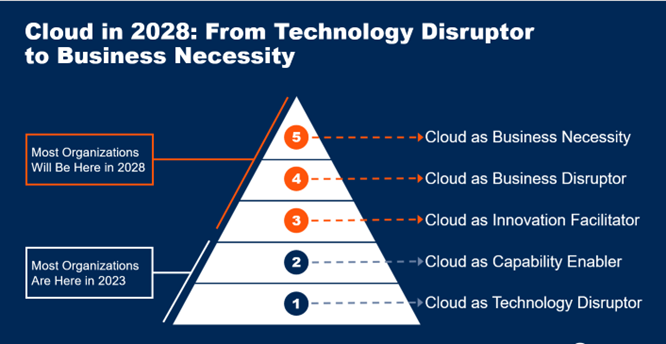From online banking to storing photos from the latest team event, everything is transitioning to the cloud. Given this shift, why not extend access control management to the cloud too? Traditionally, access control systems were confined to on-premise solutions, but with the rise of cloud technology, businesses should turn to cloud-based access control. We’ll tell you why!
Cloud-Based Access Control as a Business Necessity?
Absolutely! Gartner forecasts that by 2028, cloud computing will transition from a technological disruptor to a fundamental component for sustaining business competitiveness. It says that organisations will increasingly invest in cloud technology to drive innovation, disrupt markets, and enhance customer retention. By leveraging cloud platforms as both a technology disruptor and capability enabler, businesses can unlock transformative potential, driving digital transformation and business growth.
This prediction aligns with real-world trends: a recent Google Cloud survey of over 1,900 executives reveals leaders are doubling down on cloud for stability and resilience in the current macroeconomic climate. The survey, conducted quarterly to gauge cloud decision-maker concerns, uncovered:
- 41.4% plan to increase investment in cloud services/products.
- 33.4% plan to migrate legacy enterprise software to the cloud.
- 32.8% plan to migrate on-premises workloads to the cloud.
Ultimately, this trend underscores the growing confidence in cloud-based solutions and signals a shift towards modern, agile business practices. Access control, a critical aspect of business operations, is no exception. Cloud-based access control will become indispensable for businesses seeking agility and enhanced security.
The Advantages of Cloud-Based Access Control
1. Enhanced Flexibility
Cloud-based access control offers unparalleled flexibility and scalability compared to traditional on-premise solutions. Whether managing access for a high turnover environment or multiple sites, cloud-based systems provide centralized management, allowing businesses to adapt seamlessly to evolving needs. With a cloud-based security infrastructure, access to every location, every employee or customer can be managed from one platform. Centrally managing and monitoring access permissions provides a high level of flexibility for a business and, for first movers, a real advantage over the competition.
With the ability to scale infrastructure up or down effortlessly, companies can create fair business models tailored to their target audience. For example, a coworking operator can not only rent tables but also charge a fee for access to specific lockers and roll cabinets.
2. Improved Convenience
Cloud-based access control systems offer a game-changer in convenience compared to their on-premise counterparts. Gone are the days of physically transferring data or being tied to a specific location for management. With an internet connection and any device, authorized personnel can now access the system remotely, unlocking powerful capabilities like centralized management anywhere. Imagine granting access permissions, monitoring activity, and responding to security incidents in real time, all from your laptop on the beach! This centralized control eliminates location barriers, boosting operational efficiency and empowering swift response to threats. Another game changer: real-time visibility, real-time action: Unlike the delayed updates of on-premise systems, cloud-based access control operates in real-time. Need to grant a service technician temporary access? Done instantly, without anyone needing to be physically present.
This enhanced accessibility translates to peace of mind and proactive security. You’re no longer limited by physical proximity, ensuring your system remains agile and responsive to your needs.
3. Enhanced Security and Reliability
Cloud-based access control solutions are built on robust, enterprise-grade infrastructure with advanced security features and protocols. By leveraging encryption, multifactor authentication, and continuous monitoring, cloud-based systems provide a higher level of security compared to traditional on-premise solutions. Additionally, cloud providers employ stringent data backup and redundancy measures.
Automatic software updates and patches are important to ensure that the access control system is up-to-date and that potential vulnerabilities are addressed. One thing is clear: the cloud is optimally patched. With a cloud-based access control system, updates are carried out quickly. This helps increase system efficiency and security while reducing the risk of human errors.
4. Scalability Through Integrations
Cloud-based access control solutions are designed to seamlessly integrate with other cloud-based services and enterprise applications. Open interfaces allow the simple implementation of external services in your services and facilitate interoperability. Our detailed API documentation shows how to integrate with Tapkey’s access technology.
Scalability through integrations goes beyond convenience. It translates to significant cost savings, streamlined processes, and a holistic approach to security that adapts to your evolving needs. So, think bigger than access control – think of connected security solutions for the future.
5. Cost-Efficiency and Reduced IT Overhead
Implementing and maintaining on-premise access control systems can be costly and resource-intensive—requiring significant upfront investment in hardware, software, and IT infrastructure. In contrast, cloud-based access control operates on a predictable subscription-based model. It also eliminates the need for costly hardware procurement, only requiring modern digital locks, which ditch the need for a complex wiring infrastructure. This minimization of hardware and infrastructure translates to significant cost savings. Additionally, updates and maintenance happen automatically, freeing your valuable IT team from tedious tasks and allowing them to focus on your core business. This shift in resource allocation, combined with predictable subscription models, translates to true cost efficiency. It’s not just about convenience; cloud-based access control is smart security that empowers you to do more with less.
In conclusion, cloud-based access control has become a business necessity in today’s digital landscape. By embracing cloud technology, businesses can future-proof their security infrastructure, enhance operational efficiency, and stay ahead in an increasingly competitive market. Whether you’re a small startup or a large enterprise, investing in cloud-based access control is not just a smart decision—it’s imperative for ensuring the security and success of your business in the digital age. Don’t wait—unlock your business potential with cloud-based access control today.
Local server is not necessary
Increased security through automated security updates and built-in solutions for resiliency and disaster recovery
Lower hardware costs: Initial investment, installation, and maintenance
Increased scalability and flexibility
Plug and play components available
Simplified networking
ON-PREMISE
Local server is necessary, but control over infrastructure
Law compliance
Full isolation of services and data
Extra costs for maintenance of software updates
Higher upfront costs for the purchase of local servers and other hardware
Requires the presence of a specialist on site who can respond to problems




Looking to the Future of OSS Mobile Access
Take a look at the OSS Mobile Access [...]
Mehr lesenOct
6 Crucial Benefits of PropTech
There are several ways in which developments in [...]
Mehr lesenFeb
Why Coworking Spaces Benefit From Mobile Access
Coworking spaces all over Europe use Tapkey and [...]
Mehr lesenMay
Influential People in Mobility
Would you like to delve deeper into the [...]
Mehr lesenDec